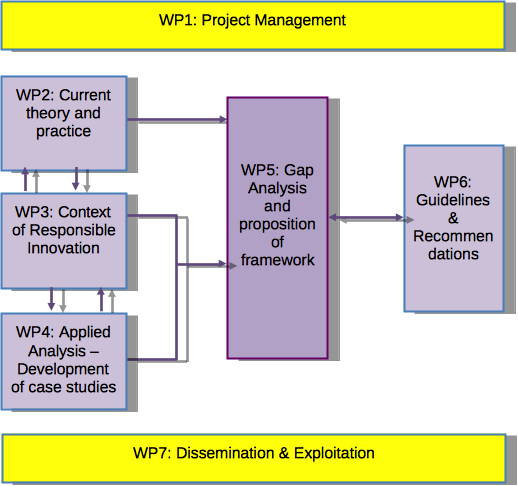Work Packages

WP 1 - Project Management
In WP1 the objectives are to monitor the overall performance of the project and to ensure that the consortium will reach its objectives; to coordinate overall project administrative and networking subjects; to report progress to the European Commission; to assess conformity of the results with the initial project scope and goals; to promote project visibility and assess quality of results; to promote dissemination and acceptance of project results in the relevant international forums; to efficiently resolve any project internal conflicts; to ensure data protection and privacy; to administer project resources and monitor project spending, as well as being prepared and able to cope with unexpected occurrences; to manage audit procedures; to define «project procedures» to assure compliance with requirements.
WP 2 - Current theory and practice
In WP2 the objectives are to establish robust and relevant conceptual tools for empirical research on responsible innovation. Mainly theoretical, this part of the project will map the main definitions and controversies around responsibility and innovation. It will analyse the tensions and possible complementarities between them (sustainability). The concepts will be replaced in the convergence between environmental ethics and technological ethics, which are evolving in two separated areas.
This conceptual work will be processed through interdisciplinary confrontation (moral and political philosophy, law, economics, law, engineering and natural sciences). Some related concepts; accountability, precautionary principle-, which are important in European building will be treated as well. A special concern will be focused on participative governance, combined with a high level of quality of the outputs in term of the selected criteria. Participation will not only be assessed by political criteria but relationally to the production processes and the products themselves.
WP 3 - Context of Responsible Innovation
The objectives of WP3 are:
To develop an understanding of the context of Responsible Research and Innovation focusing on the landscape of EU funded projects, industry and research agencies.
To build a corpus of empirical findings and identify governance patterns relating to RRI and to create a taxonomy of common approaches
To develop methods and approaches for assessing and evaluating outputs of the project with user communities.
WP 4 - Applied Analisys - Development of case studies
In WP4 the objectives are to carry out an empirical investigation into how responsible innovation is currently conceptualised, how it is currently considered in research, and how the integration could be improved in the future. The empirical domain for this will be a survey on a special sample of research and innovation networks in the current CIP Programme of the European Commission, i.e the projects of The Information and Communication Technologies Policy Support Programme. On this basis, a sub-sample will be chosen which will be investigated using in-depth case studies. Calibrated by data from the survey and the case studies, this WP will then apply and further develop an agent-based model for ex-ante evaluation of research and innovation networks (SKIN-INFSO), which simulates scenarios for collaborative research and innovation networks under various policy conditions using real-world-data. The model will be extended by the RRI categories suggested in the project and found by the empirical work. Simulations will experiment with policies for implementing responsible innovation strategies in research and evaluate future scenarios. Furthermore, a sample of SMEs and ERC research projects will be investigated, as well, in order a diversity of cases be available.
WP 5 - Gap Analysis and proposition of framework
In WP5 the objectives are to pinpoint the existing gap between the empirical findings and the theoretical background. Concrete investigation of appropriateness and gaps in existing theories will be assessed, and analysis will be conducted of the practical role of theory in responsible innovation, in an attempt to align its impact with the approaches and methods employed.
Also, extensive focus for MASIS work continuation and enrichment will be given.
WP 6 - Guidelines and Recommendations
The GREAT project, as part of the Science in Society aspect of FP7, is tasked with undertaking research that can affect policy and further European goals as discussed in section 1. It is therefore of central importance that the research findings formulated and synthesised in WPs 2 to 5, are translated into manageable and applicable recommendations, guidelines that allow stakeholders to improve their approach to responsible research and innovation.
Work package 6 will therefore ensure that the research is conducted with a view to this aim. It will translate research results into guidelines and ICT tools in collaboration with the most important stakeholders and assess the usefulness and ease of use of the resulting guidelines with a view to optimising the wider uptake of project results.
WP 7 - Dissemination and Exploitation
In WP7 the objectives are to develop the most effective dissemination strategy to make widely public the GREAT project model, its scientific base and its outcomes.
To implement the proper dissemination activities to leverage the impact of the GREAT project.
To successfully develop the GREAT project exploitation plan, where the outcomes of the project will be on focus for further exploitation.
 Contact us:
Contact us: